Existing User Log In
New User Registration
Register for a free account to gain full access to the VGChartz Network and join our thriving community.



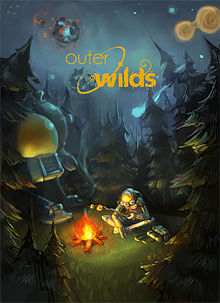

America - Front
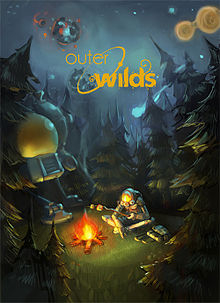

America - Back

Mobius Digital
Adventure
 (Add Date)
(Add Date) (Add Date)
(Add Date) (Add Date)
(Add Date)
| Owners: | 0 |
| Favorite: | 0 |
| Tracked: | 0 |
| Wishlist: | 0 |
| Now Playing: | 0 |
It's tough to evaluate a game like Outer Wilds when so much of its inherent value comes from the player's heuristic discoveries. Churning out vague praises like "excellent design" will leave any reader unmoved, while specific descriptions could wind up counting as SPOILERS – even if that's not my intention. It compels discussions about storytelling and design philosophy, but won't court the same fervor or enthusiasm without your agency behind it. That’s at the beating heart of why Mobius Digital’s first effort is a landmark title.
Your unnamed protagonist awakens near a campfire looking up at the stars. Another four-eyed, blue-skinned alien (called a "Hearthian") is chilling next to you roasting marshmallows. Today's a big day: you're officially an astronaut. Only the necessary launch codes are keeping you within this quaint village. Once acquired, this unique galaxy is your oyster... for a short while. Its sun is destined to go supernova after 22 in-game minutes. Instead of being permanently vaporized in a vicious heat death, you'll open your eyes again at the same campfire and redwood trees. You've found yourself caught in a time loop. The only things left intact after every loop are your accumulated memories and your updated ship log.
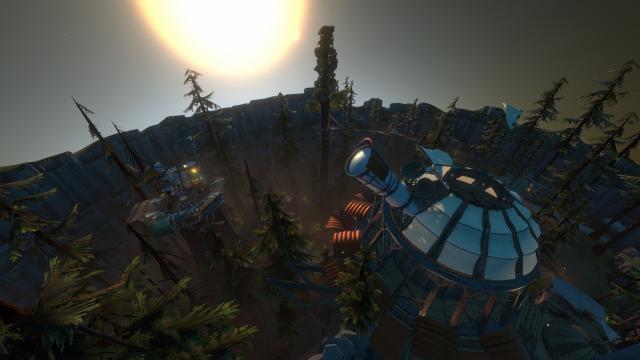
The simplistic genius of Mobius’ design is that constant: the only progression is acquired knowledge, not character stats nor upgraded baubles. With a ticking clock in the background and the fetters of a 'final' death now gone, your intrinsic curiosity about these planets, their clockwork routines, their unique hazards, and so on, fuels you to uncover their secrets and subsequently that of a long-past alien civilization (The Nomai). Where to go next is solely at your discretion and what background details you unearth typically lure you to another place. You'll quickly evolve into this peripatetic solar sailor, hopping and bopping between wonderfully-unique worlds for a jettisoned escape pod, crucial information about reaching a new area, or just saying hello to one of your fellow astronauts also camping under the stars.
While not a full-on RPG simulation, its design echoes Warren Spector's "One City Block" idea to a great degree: rather than exploration fixating on a wide, waist-deep pool, it's treated more like a deep subterranean tunnel. It's relatively quick to zoom from one side of this toy-box galaxy to the other, but far longer to truly bore into each world and know when certain opportunities will open up; in fact, some of those opportunity windows may be little more than a few seconds. Each celestial body is functioning on a set routine that's for you to understand and respect.
These intricate worlds are buttressed by well-rounded mechanical tactility as well. You have everything once acquiring the launch codes: flashlight, spaceship, spacesuit/jetpack combo, Nomai language translator, audio signal tracker, and the Little Scout. The Scout in particular is a handy navigational tool for revealing dangerous spots filled with deadly Ghost Matter or fitting through small windows to photograph potential hidden pathways (fed through your helmet’s interface). Naturally, though, the favorite tools involve jet fuel to some degree. Since it sticks close to hard science, a hearty chunk of the challenge comes from mastering this space simulation and testing creative navigational solutions, like using a gravity well as a means of crossing canyon-sized gaps.
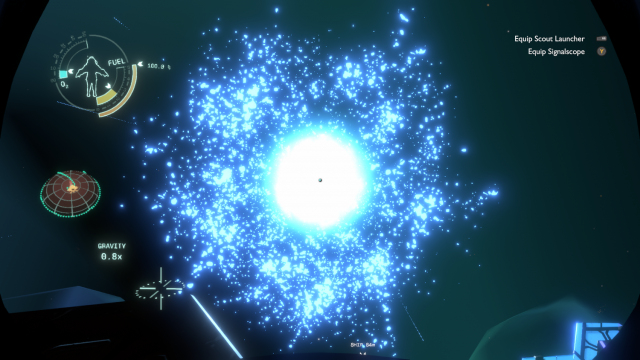
Beyond the mechanics, you can see how Outer Wilds' difficulty lays so much emphasis on self-discovery. It's so pure in this intent that even little map markers or guiding lines would run against its philosophy; the closest you'll get is an orange notification and text to a corresponding picture in your logbook's flow chart. It's just enough to say "let's plan to go back here" without robbing you of those a-ha! moments when perusing the world. Like an archeological dig, it's a one-way street of you doing the work to get a clearer and clearer look at that fossil; in keeping with that comparison, it stays silent about which direction you ought to take, leading to you potentially unearthing crucial details from your curiosity before getting any straightforward hints.
Naturally, as that once-impenetrable puzzle box becomes clearer, the endorphin hits aren't as frequent. Maybe the last couple of quandaries just aren't clicking for you and the risk of re-looping sounds less and less exciting. That seemingly-inscrutable brainteaser may also be tied to you waiting for the right time to try again, although those cases are easily allayed by fast-forwarding time at a campfire. The demand for surmounting a couple of hurdles may be steep – almost everyone has hit that wall - but everything feels so rewarding once that threshold is crossed.
More than anything else, the best endorsement for Outer Wilds' design is how its repeating cycle never lost my attention. The inherent repetition in time loops runs the risk of deflating enthusiasm, so it's remarkable how Mobius circumnavigates around that issue. A huge part of that comes from how enjoyable it constantly feels: the kinesthetically-pleasing locomotion, the perfect scale of the solar system, the spaceflight physics, the tantalizing puzzle box, its respect for the player's intelligence, and the copious amount of wonderful discoveries. The other crucial dynamic is how all of these quality elements consistently inform your place within this solar system, from every death being interwoven into the narrative to the unspoken ways in which you can "break" the game. Everything feels hermetically-sealed from top to bottom.
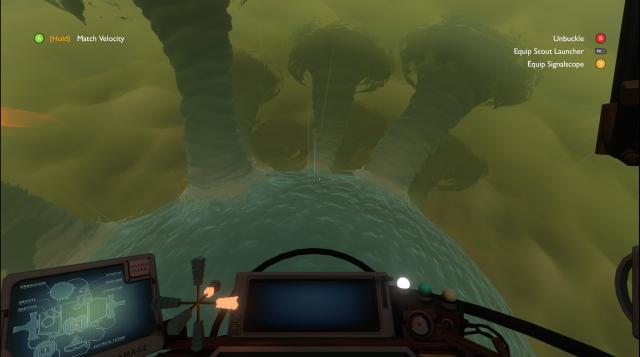
As great as those interlocking gears are, the special atmosphere and storytelling rocket it past the stratosphere.
Outer Wilds' time loop and design ethos of self-discovery aren't just exciting gameplay concepts, they're wedded to its main themes. The oncoming solar obliteration has a greater significance than splattering against a rockface at terminal velocity because of the existential dread of the former. Your feverish hunt to learn all about the Nomai and their troubles also ignites questions about the ultimate purpose in doing so. As heavy as some of these dilemmas are, none of it's beaten over your head. All of the characterization feels succinct and genial without interrupting any grander cosmic meditations.
Genial is a fitting word for the overall tone too. From the banjo-led track for the main menu to Hearthian visual design, you're being welcomed into a folksy atmosphere from the beginning. Each piece of Hearthian equipment, spaceship included, has this DIY function and attitude behind it - a mixture of metal, cut pinewood strips, retro-futurist tech, and some duct tape. In many ways, Andrew Prahlow's exceptional soundtrack balances a similar contrast; there's the heavier synth and atmospheric focus in capturing the vastitude of space along with mellow bluegrass and traditional instruments. You can imagine a similar audio/visual tapestry if a folk band from Arkansas consisting of space-faring adventurers stumbled upon an advanced alien civilization.
At first glance, these contrasts would seem to mix like oil and water, given the all-encompassing grandeur. It's actually the opposite. The story clicks by earnestly acknowledging the cosmic insignificance of it all while enveloping you in a warm blanket. That heartfelt buoyancy in the wake of such mesmerizing scale led to a finale (the canon ending) that's equal parts frightening and comfortable whilst remaining tonally consistent. To avoid giving too much away, I'll just say it's among the best endings by marrying subtle interactivity with a meaningful message.
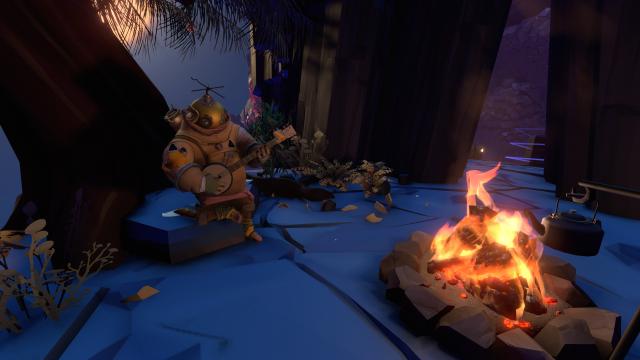
Since knowledge is your only limiter, one could look up the details online and speedrun to the true ending in a half-hour. But that tactic would permanently dampen the intrinsic yearning of self-discovery, of piecing back the fascinating layers bit by bit. If striving to uncover this world yourself, the time spent can balloon from the mid-10 to mid-20 hour mark (depending on how much you wish to uncover). Beyond simple number-crunching, the greater value comes in discovering more of this expertly-crafted world. It's now easier to appreciate this clockwork galaxy too thanks to the 9th-gen versions (PS5 or Xbox Series). While falling in line with the standard free update from an indie team, I feel fortunate to have first experienced it at 60FPS with hardly any technical mishaps.
Beyond being the new template with which I compare other time loop titles, Outer Wilds ranks among the greatest games I’ve ever played. Despite juggling psychics-driven space simulation, xenoarchaeology, time loops, unfettered exploration, first-person platforming, and puzzle-solving, everything congeals into a singular vision. By paring down any ancillary rewards like talent trees and exclusively focusing on acquired knowledge, every trial run grants an equal opportunity to unspool this tantalizing narrative yarn. When considered with its other great elements – art, music, sound design, thematic poignancy, and so on - it's all the more easy to appreciate how Mobius did the impossible: make the same 22 minutes feel timeless.
Contractor by trade and writer by hobby, Lee's obnoxious criticisms have found a way to be featured across several gaming sites: N4G, VGChartz, Gaming Nexus, DarkStation, and TechRaptor! He started gaming in the mid-90s and has had the privilege in playing many games across a plethora of platforms. Reader warning: each click given to his articles only helps to inflate his Texas-sized ego. Proceed with caution.









